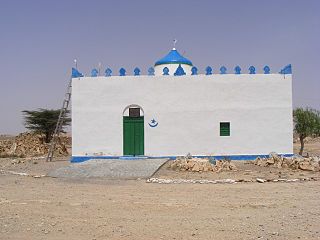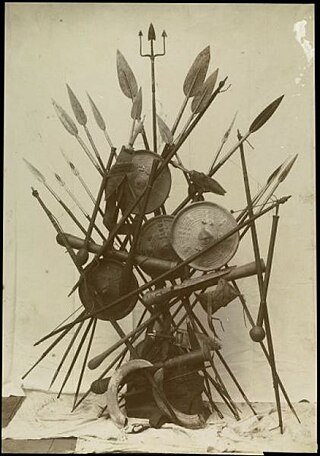
Ogaden is one of the historical names used for the modern Somali Region. It is also natively referred to as Soomaali Galbeed. The region forms the eastern portion of Ethiopia and borders Somalia. It also includes another region to the north known as Haud.

Greater Somalia sometimes also called Greater Somaliland is the geographic location comprising the regions in the Horn of Africa in which ethnic Somalis live and have historically inhabited.

The Ogaden National Liberation Front, Abbreviated ONLF; Somali: Jabhadda Waddaniga Xoreynta Ogaadeeniya, Abbrieviated JAWXO; Arabic: الجبهة الوطنية لتحرير أوجادين, romanized: Al-Jabhat al-wataniat litahrir 'Awjadin, Abbreviated ALJAWLA, is a Somali politico-military organization which aims for the right to Self-determination of the Somali People in the Ogaden or the Somali Region under the control of Ethiopia.

The Hawiye are one of the principal and largest of the Somali clans, tracing their lineage back to Sheikh Ahmed Bin Abdulrahman Bin Uthman, also known as Sheikh Hawiye, the eponymous figure of the clan. They are considered the earliest documented clan to have settled in the Somali peninsula, as noted in the 12th century by Al-Idrisi, occupying the regions spanning from Ras Hafun to Merca, which served as their capital. Presently, the Hawiye reside in central and southern Somalia, Somaliland, Djibouti, the Somali region of Ethiopia, Harar, Oromia, and Afar regions, as well as Kenya. Furthermore, they represent the majority of the population in the capital city of Mogadishu.

The Darod is a Somali clan. The forefather of this clan is Sheikh Abdirahman bin Isma'il al-Jabarti, more commonly known as Darod. The clan primarily settles the apex of the Horn of Africa and its peripheries, the Somali hinterlands adjacent to Oromia (Ogaden), and both sides of the Kenya–Somalia border. The Darod clan is the largest Somali clan family in the Horn of Africa.

The Dir is one of the largest and most prominent Somali clans in the Horn of Africa. They are also considered to be the oldest Somali stock to have inhabited the region. Its members inhabit Djibouti, Somalia, Ethiopia, and northeastern Kenya.

The Rahanweyn, also known as the Digil and Mirifle is a major Somali clan. It is one of the major Somali clans in the Horn of Africa, with a large territory in the densely populated fertile valleys of the Jubba and Shebelle rivers and the areas inbetween, which are mainly inhabited by settlers from the Digil and Mirifle lineages.

The Ogaden is one of the major Somali clans in the Horn of Africa.

Al-Itihaad al-Islamiya was an Islamist politico-military group in Somalia. Formed in 1983 through a merger of smaller Islamist groups, the organization was the most powerful Islamic movement in the country during the late 80s and early 90s. It also had the most widespread clan following of all the Islamist factions across the nation and professed the aim of creating a Somali Islamic state.
Ayr is a Somali clan that is part of the larger Habar Gidir Hawiye clan. The Ayr clan is the eldest Habargidir sub-clan and is the largest Habargidir sub-clan in population. The Ayr clan have a rich history in Somali society and has played an important role in shaping Somali history and national politics. Members of the clan reside in 6 out of the total 18 regions of Somalia but are primarily found in the central region of Somalia - Galgaduud region which they hold a monopoly over and is considered their heartlands. They are considered the most powerful sub-clan in central and southern Somalia controlling important sections of the country and greatly influencing the nation's capital Mogadishu, holding the 1st mayorship position in the post-independence era. The Ayr are regarded as being very large in numbers because they are spread throughout numerous regions in Somalia and are significant to the country's political, economic, social, and military sectors.

The 2006 Islamic Courts Union offensive is the period in the Somali Civil War that began in May 2006 with the Islamic Courts Union's (ICU) conquest of Mogadishu from the Alliance for the Restoration of Peace and Counter-Terrorism (ARPCT) and continued with further ICU expansion in the country. Following the outbreak of the war on December 21, 2006; by December 24, direct Ethiopian intervention in the conflict in support of the Transitional Federal Government (TFG) was no longer denied by the Ethiopian government. The Eritrean government denied any involvement despite Ethiopian claims to the contrary.

The Murusade, also contemporarily known as Mursal, are a Somali subclan, part of the Karanle branch of the larger Hawiye Clan. They primarily reside in the central regions of Somalia, particularly in the Galgaduud, Lower Shabelle, Middle Shabelle and Banadir regions.
Over the course of the Somali Civil War, there have been many revolutionary movements and militia groups run by competing rebel leaders which have held de facto control over vast areas within Somalia.
The timeline of events in the War in Somalia during 2006 is set out below.

The Bimaal or Bimal, are a sub-clan of the major Dir clan family. This clan is widely known for leading a resistance against the colonials in southern Somalia for decades which can be compared to the war of the Sayyid in Somaliland. The Biimaal mainly lives in southern Somalia, the Somali region of Ethiopia, which their Gaadsen sub-clan mainly inhabits.
Qallo is one of the thirteen sub-clans of the Somali Sheikhal clan.

The Hiraab clan, is a prominent Somali clan belonging to the larger Hawiye clan. Renowned for its influential role, the Hiraab clan has produced numerous significant leaders within Somalia, including six presidents, the first president and prime minister of Somalia, and various other prominent figures. The clan's historical contributions include pioneering military leadership roles, and establishing a foundational influence in Somalia.
The Gurgura, Gorgorah or Gurgure is a northern Somali clan, a sub-division of the Dir clan family.

Somalis in Ethiopia refers to the ethnic Somalis from Ethiopia, particularly the Ogaden, officially known as the Somali Region. Their language is primarily Somali and are predominantly Muslim. According to the 2007 census from the Central Statistical Authority, the Somalis were the third largest ethnic group in Ethiopia with roughly 4.6 million people accounting for 8.2% of the country's population, after Oromo (34.4%) and Amhara (27%). The Somali population in Ethiopia make up around 30% of the total Somali population worldwide.

The Ethiopia–Somalia border stretches 1,500 kilometers. In the 19th century, both Britain and Italy contributed to shaping the modern border, on behalf of their colonies of British and Italian Somaliland. The Somali people were thus under British, French, Italian and Ethiopian rule. During World War II, Britain gained control of the Ogaden and Haud territories and returned them to Ethiopia in 1954, but not delimited beyond the provisional line. Since 1960 independence, the border has suffered serious skirmishes involving both countries' soldiers. From 1977 to 1978, Ethiopia and Somalia fought in the Ogaden War led by Colonel Mengistu Haile Mariam and General Siad Barre respectively. The EPRDF government demarcated the border of Ogaden into Somali Region. Somalia is located at the base of Ethiopia's protrude southeast region; from the South, it is bounded by Wabi Shebelle and Genale Valley.













